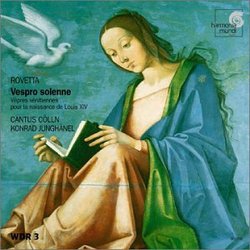| All Artists: Giovanni Rovetta, Giovanni Battista Buonamente, Konrad Junghanel, Carsten Lohff Title: Rovetta: Vespro solenne Members Wishing: 0 Total Copies: 0 Label: Harmonia Mundi Fr. Release Date: 4/10/2001 Album Type: Import Genre: Classical Styles: Opera & Classical Vocal, Chamber Music, Historical Periods, Baroque (c.1600-1750), Classical (c.1770-1830) Number of Discs: 1 SwapaCD Credits: 1 UPC: 794881628322 |
Search - Giovanni Rovetta, Giovanni Battista Buonamente, Konrad Junghanel :: Rovetta: Vespro solenne
 | Giovanni Rovetta, Giovanni Battista Buonamente, Konrad Junghanel Rovetta: Vespro solenne Genre: Classical
|
Larger Image |
CD Details |
CD ReviewsExcellent, but no French connection... 09/05/2002 (5 out of 5 stars) "Giovanni Rovetta (c.1595-1668) succeeded Monteverdi as Maestro di capella at St Mark's in 1644, and naturally the style of these vespers is much indebted to the great master. The pieces presented here are handpicked from Rovetta's 1639-collection and could have been heard at any vesper in St Mark's during the 1630's and 1640's; they have absolutely nothing to do with the birth of the future sun-king, all this is merely a combination of PR and loose historical facts (it was Rovetta's Te Deum that was performed on that occasion, an information from the booklet!). All this is absolutely irrelevant, since there is much lovely music on this disc; the psalms does not posses the innovative genius of Monteverdi, but they are written in an indisputable more fluent and elegant manner. It's quite reasonable to compare these pieces with the sacred music of Rovetta's colleague, Cavalli, whose church music you might know from Bruce Dickey's equally excellent Harmonia Mundi-recording. We find the same melodic gifts in Rovetta's music, as well as a good deal of dramatic sense. Rovetta's style is more concise, which is good, and his ensemble writing is perhaps more intimate and madrigalesque than Cavalli's. This is another reason for that the one-voice-per-part works well here; furthermore, Cantus Cölln is above all characterized by their unique ability to present a powerfull tutti-sound, when this is needed, never being dominated by the brass, which, admittedly, is a potential risk in "OVPP"-recordings. Furthermore it's worth mentioning that the instrumental ensemble in the manuscript constitutes of two violins and BC; cornetts are added here but there are no trombones.Thus, these vespers are "medium-scale". I dont think that a full choir would have produced more impressive and moving performances of the initial "Dixit Dominus...", the cry "Confessio..." in the Confitebor or the "Potens in Terra..." in the Beatus Vir, than Cantus Cölln does here. Actually, with a full choir I would fear a loss of rhytmic vitality, textual clarity ( a MUST in 17th century music) and a narrowing of expressive range. If you love early baroque music, you'll love this recording, with Cantus Cölln as well as Harmonia Mundi engineering at usual high standards." One Voice Per Part? What the!!??? Steven Guy | Croydon, South Australia | 04/08/2002 (4 out of 5 stars) "This recording contains some very attractive music by a composer of considerable power. The performances are strong and the playing from the musicians is very good.
But why has OVPP been used? This is one of the strangest uses of this approach I have ever heard! What makes this approach seem to be so out of step is that the program notes for the CD (not written by Junghanel or any of the other performers) actually clearly states that these works were performed in Rovetta's day by as many performers as they could muster! In fact singers from all over town were brought in for the performance. Buy this CD for the music but be aware that this is very much a stingy, meagre approach to this music.No doubt the Amazon editorial OVPP cheerleaders will propagandise about this performance being so much better and 'authentic' (hardly!) because it is OVPP but, to paraphrase the words of Christine Keeler, "Well, they would say that, wouldn't they!?"Please, can we have recordings of music that reflect the composers' intentions - not the current 'trendy' ideas?" |

 Track Listings (11) - Disc #1
Track Listings (11) - Disc #1